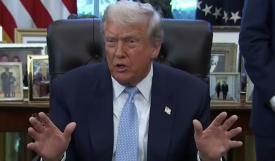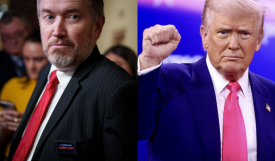A Year Since Edward Snowden: The Five Most Important Things to Know — Part 2
A year ago, Glenn Greenwald at The Guardian published the first of what would become an avalanche of leaks from ex-NSA contractor Edward Snowden about the U.S. National Security Agency and the modern world of digital surveillance and spying. Here are the five most important takeaways from a year that changed our perspective on our privacy in the digital age — part 2. (Read part 1 here).
4: We Allowed This to Happen
Too often, the NSA is simplistically portrayed as the "bad guy": an out-of-control agency usurping its authority and spreading its big-brother control over the Internet. And similarly, we often consider ourselves the victims: helpless subjects of an Orwellian world that has been thrust upon us.
And there's some truth to that story, simplistic though it may be. Before Snowden, U.S. citizens had no idea about most of these surveillance programs because, of course, they were kept secret; Snowden's whole reason behind the leaks was to spur informed public debate.
And the inception of secret domestic eavesdropping operations began with an order signed by President Bush that was so secret "that even many of the country's senior national security officials, men and women with highest security clearances in his administration, knew nothing about it," according to "Bush's Law," an account of the post 9/11 aftermath (via EFF).
But an overwhelming majority of Americans supported the USA Patriot Act — sections of which were later used to justify NSA programs — in 2002 and 2003, and even after "heightened public concern about government intrusions" in 2005, a Washington Post poll found that six in 10 Americans favored extending the law.
After that poll, in late 2005, The New York Times first exposed the NSA's warrantless spying program. In 2006, the public knew about the "secret room" marked 641A in one of AT&T's communications hubs, which had a traffic splitter and scanner so that any and all "traffic that passed through AT&T's own network could be scanned" by the NSA, as Ars Technica put it at the time.
Still, the USA Patriot Act, and modified iterations of it, were extended by Congress several more times over the coming years, under both administrations. Even in 2011, a Pew poll found that more Americans (42 percent) thought the government's spying powers were a "necessary tool" in the War on Terror, while only 32 percent said it posed a "threat to civil liberties."
While public knowledge about government surveillance then certainly wasn't as rich and thorough as it has become in the past year, we knew that warrantless domestic spying was occurring for more than six years — through two different presidential elections and five Congressional elections — but public opinion only experienced a major shift against U.S. government surveillance powers after the Snowden revelations began to flow.
It's also important to note, as the recent PBS Frontline documentary "United States of Secrets" details in Part 2, that over those same post 9/11 years, Silicon Valley — Google, Facebook, Yahoo, Apple, the iPhone and smartphones in general — equally exploded in popularity, profitability and (in tandem) in its ability to record information about increasingly large parts of our lives. And in most cases, most notably social media, the public was not only okay with that, but we also volunteered personal information as we interacted more and more online.
The more information we allowed to be collected by those companies, the more opportunities the NSA had for richer surveillance — and the more opportunities for data breaches and cyber attacks to flood our sensitive data to nefarious hackers (it also didn't help that one of the NSA's initiatives was to deliberately compromise cybersecurity standards to benefit its surveillance capabilities).
As technology expert Clay Shirky once said, technology companies like Google and others have the unofficial motto "Collect everything you can" baked into their very DNA. It's no wonder the NSA seems to have the same outlook and increasingly tied itself into Silicon Valley over the past decade with programs like PRISM — even though those tech companies are clearly not very comfortable with how that reflects on them.
Over the past decade, we embraced the digital, connected side of our lives — mobile, personal, financial, and everything else — and accordingly, we put our lives up for hackers, companies and government agencies (authorized by laws we supported) to exploit.
5: We Can Still Take Back Control Over Our Privacy
If in the past decade we were lulled to sleep by technological convenience and national security — dreaming that our privacy was still intact — the last year has been a wake-up call.
Now, a tide of pro-privacy, pro-data security action is sweeping the U.S. and other parts of the world.
Major technology companies have now changed their transparency policies, reporting to users, whenever legally possible, when a government law enforcement agency requests a seizure of their data, despite criticism from U.S. officials. Pressure from watchdogs, government-appointed panels and the public have already forced some changes to the NSA's metadata collection policies. Europe's highest court recently ruled in favor of a law that gives Europeans the "right to be forgotten" by search engines like Google online.
For their part, Google, Yahoo and other IT giants have quickly begun encrypting all communications between data centers so that NSA and others cannot tap into pure streams of unprotected user data. Google also recently announced it was implementing automatic "end-to-end" email encryption for all email traffic, which was originally something only spies used. And the U.S. Congress and the Federal Trade Commission are considering legislation to force data brokers to be more transparent and give consumers greater knowledge of who has what personal data and how to opt out of sharing.
As of January of this year, according to a Pew poll, a majority of Americans (53 percent) now disapprove of the government's "collection of telephone and Internet data as part of anti-terrorism efforts." And there are currently several bills in Congress that would reform NSA practices with support from both sides of the political spectrum; this includes a bill from Rep. Jim Sensenbrenner, R-Wis., who cowrote the original Patriot Act but now says he wants to put the government's "metadata program out of business."
Besides educating yourself on how to protect your data online and knowing which companies do the same, the average citizen concerned with their loss of privacy can still affect change in the old fashioned democratic way: voicing your opinion to your representative and, if that doesn't work, voting for representatives that share your concerns and promise action.
Subscribe to Latin Post!
Sign up for our free newsletter for the Latest coverage!
© 2025 Latin Post. All rights reserved. Do not reproduce without permission.















